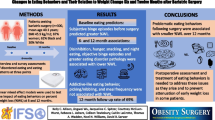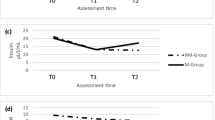Abstract
Background
Self-reported poor dietary adherence following bariatric surgery is associated with less successful weight loss outcomes. Poor dietary adherence is a global construct lacking specificity regarding its underlying, clinically targetable, maladaptive eating behaviors.
Methods
Comprehensive online survey data were obtained from a sample of 274 adults who underwent Roux-en-Y surgery in the prior 1–12 years. Correlations between dietary adherence and six eating-related behaviors were calculated, with the frequency of each behavior reported on a 7-point scale. Linear regression modeling was applied.
Results
All six maladaptive eating behaviors were highly correlated with dietary adherence (Pearson’s r > 0.5): grazing (r = − 0.565), mindless eating (r = − 0.572), loss of control eating (r = − 0.517), eating “more than is best” after dinner (r = − 0.518), eating foods off of one’s plan (r = − 0.557), and “when I eat something off-plan, I feel like I have blown it and I give up and eat more” (r = − 0.574). The estimated regression coefficients in the linear model was statistically significant, [F(5, 261) = 60.006, p < 0.001] and accounted for approximately 54% of the variance of global dietary adherence (R 2 = 0.535, adjusted R 2 = 0.526).
Conclusion
Six maladaptive eating behaviors accounted for a highly significant portion of post-Roux-en-Y patients’ poor self- reported dietary adherence. Prospective studies are needed to investigate the relationship between targetable maladaptive eating behaviors and bariatric surgery outcomes.
Similar content being viewed by others
References
Benotti PN, Armour Forse R. The role of gastric surgery in the multidisciplinary management of severe obesity. Am J Surg. 2003;163:2146–8.
Christou NV, Look D, Maclean LD. Weight gain after short-and long-limb gastric bypass in patients followed for longer than 10 years. Ann Surg. 2006;244:734–40.
Elder KA, Wolfe BM. Bariatric surgery: a review of procedures and outcomes. Gastroenterology. 2007;132:2253–71.
Karlsson J, Taft C, Rydén A, et al. Ten-year trends in health-related quality of life after surgical and conventional treatment for severe obesity: the SOS intervention study. Int J Obes. 2007;31:1248–61.
Sjöström L et al. Lifestyle, diabetes, and cardiovascular risk factors 10 years after bariatric surgery from the departments of body composition and metabolism. N Engl J Med Nord Univ Public Heal. 2004;35126351:2683–93.
Sjöström L et al. Effects of bariatric surgery on mortality in Swedish obese subjects for the Swedish obese subjects study. N. Engl J. Med. 2007;3578:741–52.
Encinosa WE, Bernard DM, Chen C-C, et al. Healthcare utilization and outcomes after bariatric surgery. Med Care. 2006;44:706–12.
Khaitan L et al. Laparoscopic revision of bariatric procedures: is it feasible? Am Surg. 2006;71:6–12.
Hamel MB, Blumenthal D, Abrams M, et al. The affordable care act at 5 years. N. Engl. J. Med. 37225:2451–8.
Porter ME. What is value in health care. N. Engl. J. Med. 2010;326:2477–81.
Wells S et al. Associations of hair cortisol concentration with self-reported measures of stress and mental health-related factors in a pooled database of diverse community samples. Stress. 2014;17:1025–3890.
Sarwer DB, Dilks RJ, West-Smith L. Dietary intake and eating behavior after bariatric surgery: threats to weight loss maintenance and strategies for success. Surg Obes Relat Dis. 2011;7:644–51.
Sarwer DB et al. Preoperative eating behavior, postoperative dietary adherence, and weight loss after gastric bypass surgery. Surg Obes Relat Dis. 2008;4:640–6.
Lanyon RI, Maxwell BM, Kraft AJ. Prediction of long-term outcome after gastric bypass surgery. Obes Surg. 2009;19:439–45.
Elkins G, Whitfield P, Marcus J, et al. Noncompliance with behavioral recommendations following bariatric surgery. Obes Surg. 2005;15:546–51.
Poole NA et al. Compliance with surgical after-care following bariatric surgery for morbid obesity_a retrospective study. Obes Surg. 2005;15:261–5.
Robinson AH, Adler S, Stevens HB, et al. What variables are associated with successful weight loss outcomes for bariatric surgery after 1 year? Surg Obes Relat Dis. 2014;10:697–704.
Robinson, A., Adler, S., Bowers, H., Arslan, Z., Luce, K., & Safer, D. Exploring predictors of post-gastric bypass surgical outcomes with receiver operating characteristics (ROC) curve analysis. Poster presented at the 2013 International Conference on Eating Disorders, Montreal, Quebec, Canada, 2013.
Safer, D. L., Robinson, A. H., Adler, S., Bowers, H. B., Arslan, Z., & Luce, L. Predicting post bariatric surgical outcomes using receiver operating curve analysis. Poster presented at the 2013 American Psychiatric Association Annual Meeting, San Francisco, 2013.
Wadden TA, Foster GD. Weight and lifestyle inventory (WALI). Surg Obes Relat Dis. 2006;2:180–99.
American Psychiatric Association. Diagnostic and statistical manual of mental disorders. 4th ed. Washington, DC: Text Revision; 2000.
American Psychiatric Association. Diagnostic and statistical manual of mental disorders. 4th ed. Washington: DC; 1994.
Fairburn CG. Cognitive behavior therapy and eating disorders. New York City: Guilford Press; 2008.
Author information
Authors and Affiliations
Corresponding author
Ethics declarations
Conflict of Interest
The authors declare that they have no conflict of interest.
Rights and permissions
About this article
Cite this article
Adler, S., Fowler, N., Robinson, A.H. et al. Correlates of Dietary Adherence and Maladaptive Eating Patterns Following Roux-en-Y Bariatric Surgery. OBES SURG 28, 1130–1135 (2018). https://doi.org/10.1007/s11695-017-2987-9
Published:
Issue Date:
DOI: https://doi.org/10.1007/s11695-017-2987-9




